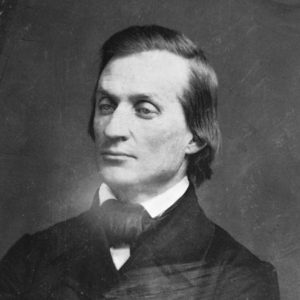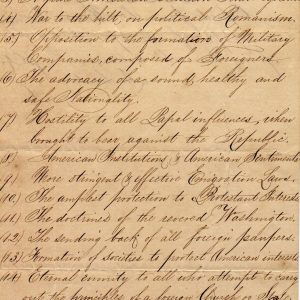calsfoundation@cals.org
Know-Nothing Party
aka: American Party
Following the collapse of their party nationally in 1852, many Arkansas Whigs found a new home in the American Party, more popularly known as the Know-Nothings. The Know-Nothings sought to avoid the nation’s impending disunion over slavery and regional divisions by replacing sectional tensions with opposition to Roman Catholics and immigrants, who were presented as potential competitors to “real” Americans for access to jobs and land.
First organized through a network of secret fraternal lodges, the Know-Nothings acquired their odd name because their members, sworn to secrecy, were supposed to answer, “I know nothing,” when asked about the party. Although the Know-Nothings did well in the Little Rock (Pulaski County) city elections in 1856, the state’s small Roman Catholic and immigrant populations limited the party’s appeal in Arkansas. For the remainder of the 1850s, the Democrats faced virtually no organized opposition to their dominance over Arkansas politics.
Given the state’s small immigrant population in the 1850s, Arkansas’s Know-Nothing movement, like the Whig movement that preceded it, had less to do with ideology or policy and more to do with access to political power and opposition to the political dynasty known as “The Family,” the political machine that dominated the territorial and state Democratic Party until the eve of the Civil War.
Arkansas’s most prominent Know-Nothing was former U.S. Senator Solon Borland. Having reluctantly given up his Senate seat in 1853 when President Franklin Pierce asked him to undertake a diplomatic mission to Central America, Borland returned to Arkansas in 1854 to find that his former Senate seat had been taken by the Family’s Robert Ward Johnson. Borland became the co-editor of the Arkansas Gazette and Democrat newspaper with C. C. Danley and became increasingly critical of the national Democratic Party for what he saw as its hostility to Southern interests and states’ rights.
The following year, Borland joined Albert Pike, Danley, former Whigs, and other anti-Family elements in Arkansas in organizing a state Know-Nothing Party. James Yell published an anti-Catholic pamphlet that led to a series of violent attacks on the small Roman Catholic population in Little Rock. These events culminated in the party’s victory in the capital city’s municipal elections in 1856. Later that year, the party nominated as its gubernatorial candidate James Yell, the nephew of Archibald Yell, the former governor who had been killed during the Mexican War. However, when the party’s national convention awarded its presidential nomination to former Whig president Millard Fillmore, a New Yorker who had been sympathetic to pro-slavery interests during his administration, Pike stormed out of the convention and publicly criticized the Know-Nothings as insufficiently pro-slavery. Yell lost the governor’s race to the Family incumbent, Elias Conway, while Arkansas awarded its electoral votes to the Democratic presidential candidate, James Buchanan.
Its leadership fractured and its candidates rejected at the polls, the Arkansas Know-Nothings quickly faded as a political force. Nationally, the Know-Nothings grew increasingly divided over the issue of slavery, although they remained a significant political force at the state and local levels in some parts of the north. By 1860, the party was spent as a national political force, with most of its former adherents gravitating toward the newly-formed Republican Party. Borland left Arkansas to edit the Memphis Enquirer for the remainder of the 1850s. Danley continued to oppose the Family as the head of the renamed Arkansas Gazette, while Pike drifted toward the Democratic Party. The Democratic Party’s dominance in Arkansas politics would remain unchallenged until after the Civil War.
For additional information:
Bolton, S. Charles. Arkansas, 1800–1860: Remote and Restless. Fayetteville: University of Arkansas Press, 1998.
Overdyke, W. Darrell. The Know-Nothing Party in the South. Baton Rouge: Louisiana State University Press, 1951.
Smith, Harold T. “The Know-Nothings in Arkansas.” Arkansas Historical Quarterly 34 (Winter 1975): 291–304.
William D. Baker
United States Department of State






Comments
No comments on this entry yet.